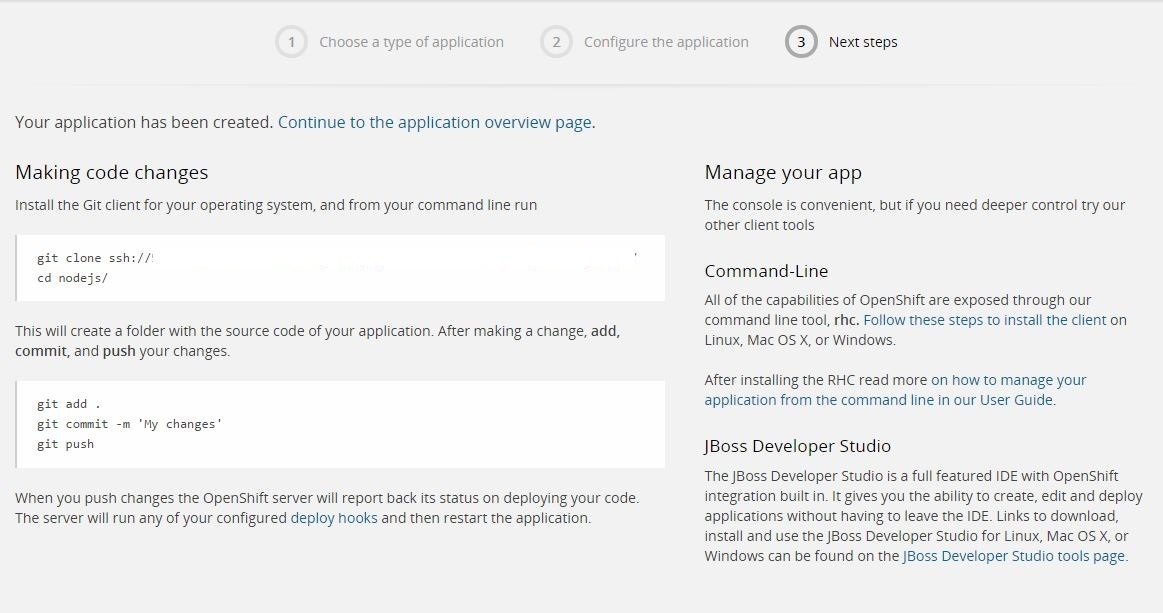67 lines
3.5 KiB
Markdown
67 lines
3.5 KiB
Markdown
|
|
---
|
||
|
|
title: Deploying to Openshift
|
||
|
|
---
|
||
|
|
If you deploy your applications to Heroku you can only upload 5 applications, if you want to deploy a new one, you need to verify you account with your credit card.
|
||
|
|
|
||
|
|

|
||
|
|
|
||
|
|
These are the steps you need to follow to deploy to <a href='https://www.openshift.com/app/account/new' target='_blank' rel='nofollow'>OpenShift</a>.
|
||
|
|
|
||
|
|
## Requirements
|
||
|
|
|
||
|
|
* An account in <a href='https://www.openshift.com/app/account/new' target='_blank' rel='nofollow'>OpenShift</a>
|
||
|
|
* Our app in a [Git](//forum.freecodecamp.com/t/wiki-git-resources/13136) Repository
|
||
|
|
|
||
|
|
## Changes in your code
|
||
|
|
|
||
|
|
* `app.listen` with `process.env.OPENSHIFT_NODEJS_PORT` and `process.env.OPENSHIFT_NODEJS_IP`, both requires.
|
||
|
|
* In your **package.json** set your `"main": 'yourMainFile.js` and `"script": { "start": "node yourMainFile.js" }`
|
||
|
|
|
||
|
|
## Deploying our app
|
||
|
|
|
||
|
|
* <a href='https://openshift.redhat.com/app/console/application_types' target='_blank' rel='nofollow'>Add a new application</a>
|
||
|
|
|
||
|
|

|
||
|
|
|
||
|
|
* Choose a name (second input will be same for all you apps)
|
||
|
|
|
||
|
|
[
|
||
|
|
|
||
|
|
* Fill our Git URL and our branch name
|
||
|
|
|
||
|
|

|
||
|
|
|
||
|
|

|
||
|
|
|
||
|
|
* "Create Application". It will take some time
|
||
|
|
|
||
|
|

|
||
|
|
|
||
|
|
* Enter to "Application", then into your App and check it's started.
|
||
|
|
|
||
|
|

|
||
|
|
|
||
|
|

|
||
|
|
|
||
|
|
## Enviroment variables
|
||
|
|
|
||
|
|
In my case I have my database in mLab, so I need to create some enviroment variables.
|
||
|
|
|
||
|
|
* <a href='https://developers.openshift.com/getting-started/windows.html#client-tools' target='_blank' rel='nofollow'>Install Ruby and rhc.</a>
|
||
|
|
|
||
|
|
**rhc** only works with versions 1.9.3 and 2.0.0 of Ruby.
|
||
|
|
|
||
|
|
* <a href='https://developers.openshift.com/getting-started/windows.html#rhc-setup' target='_blank' rel='nofollow'>Setting up Your Machine</a>
|
||
|
|
|
||
|
|
If you are having trouble with setting up `rhc`, try <a href='http://stackoverflow.com/questions/28896733/rhc-setup-gives-error-no-such-file-dl-import' target='_blank' rel='nofollow'>this</a> answer on StackOverflow.
|
||
|
|
|
||
|
|
* <a href='https://developers.openshift.com/managing-your-applications/environment-variables.html#custom-variables' target='_blank' rel='nofollow'>Custom Environment Variables</a>
|
||
|
|
|
||
|
|
`rhc env set VARIABLE=value VARIABLE2=value2 -a App_Name`.
|
||
|
|
|
||
|
|
You need to restart your app to load the variables.
|
||
|
|
|
||
|
|
If you find a better way to solve this limitation. Feel free to contribute to our <a>Wiki</a> and share it with us.
|
||
|
|
|
||
|
|
You can check the app working at <a href='http://voting-pitazo.rhcloud.com/#/polls' target='_blank' rel='nofollow'>http://voting-pitazo.rhcloud.com/#/polls</a>
|